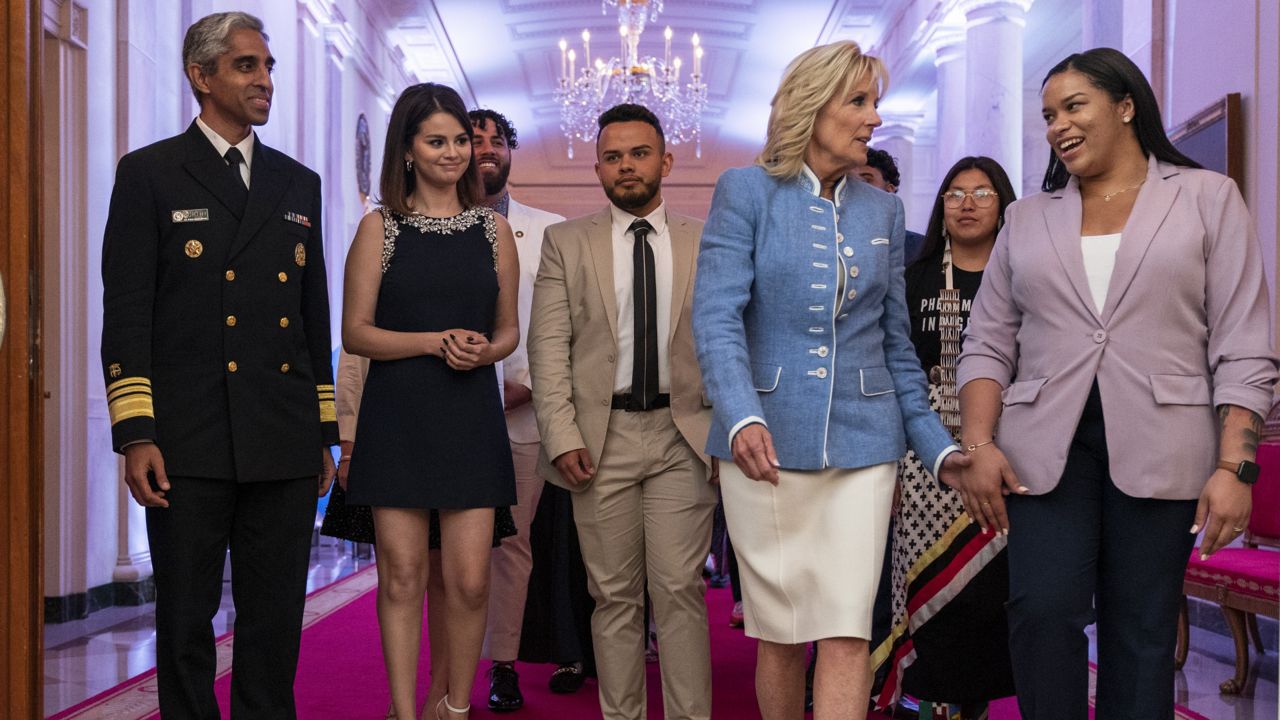First Lady Dr. Jill Biden welcomed singer and actress Selena Gomez to the White House on Wednesday for a discussion on youth mental health in an effort to bring the stigmatized topic out of the shadows and into the light.
“Everyone is here today because they have a personal connection to this issue,” Dr. Biden told an audience assembled for the discussion. “Selena Gomez has been courageously outspoken about her own challenges. [...] All of you on this stage and in our audience are here today because you too have shown incredible resilience in determination in helping us find a better way forward.”
Gomez, 29, has long been open about her own struggles with mental health, and revealed early on in the pandemic that she was diagnosed as bipolar. The “Only Murders in the Building” star said she hopes Wednesday’s summit, which was co-hosted by MTV Entertainment and the Department for Health and Human Services, can “help others feel less alone and find the help that they need.”
“I heard a phrase actually recently that I really like: that which is mentionable becomes manageable,” Gomez went on to say, adding: “We need as much help as we can possibly get developing resources and services and increasing access to those services for young people.”
The first lady went on to cite the rising mental health challenges across the United States, which have been worsening over the past several decades but were exacerbated by the pandemic.
“We're recovering every single day. But recovery isn't always the same as healing,” Dr. Biden said. “And over the last decade, an alarming number of young people have struggled with mental health challenges. And the pandemic has made it so much worse.”
Before the COVID-19 pandemic largely shut down the country in early 2020, government data indicated the amount of young people with mental health issues was already on the rise. According to a longitudinal study from the Centers for Disease Control and Prevention, the rate of high school students who said they experienced consistent and troubling feelings of sadness or hopelessness increased from 26% to almost 37% between 2009 and 2019. It also noted a “concerning increase in suicidal behaviors” among teens in the same time frame.
More Americans – particularly young adults and teens – reported mental health problems during the pandemic than ever before, prompting surgeon general Dr. Vivek Murthy to issue a rare public health advisory saying young people in America were experiencing an “alarming” and “widespread” mental health crisis early last December.
According to CDC data published in late March, 37% of high school students said they experienced poor mental health at some point during the pandemic, with 44% reporting they “persistently felt sad or hopeless during the past year” alone.
“The darkness inside us can feel heavy at times,” the first lady said to those who joined the meeting. “It takes courage to be honest about the struggles that you faced and to tell your stories.”
Wednesday’s forum, the first such gathering hosted at the White House, brought together individuals and organizations that have been working in the mental health space. Many of those present spoke of their personal experiences with trauma, anxiety, depression and how they hope to help others work on their own mental health.
Jazmine Wildcat, an 18-year-old member of the Northern Arapaho tribe in Wyoming, spoke of the continued stigma around mental health and the need to have more therapists that can relate to individuals of all races and backgrounds.
“Where I'm from on the reservation, [mental health is] not very talked about,” Wildcat said. “I’ve been to way too many funerals. And so I took the liberty to really, you know, say this isn’t okay, to really start to talk about it.”
After failing to receive the support she needed from therapists, Wildcat launched the Nii’iini Project. Nii’iini, which means “things are good” in the Arapaho language, aims to help young people in her community by volunteering and doing other activities as a “positive coping mechanism as opposed to just relying on Western medicine,” Wildcat said.
Jorge Alvarez, a 23-year-old first-generation college graduate, said his own journey with mental health began in his first year of college, when he “felt very alone” and “very lost.”
“Because of the cultural stigma [...] I didn’t really have the chance to share about myself, about my mental health,” Alvarez said. “I started to realize that the biggest barrier to entry was not having someone who looked like me, a Latino man at that, talking about mental health, giving me the space, encouraging me to get the help that I needed.”
Alvarez went on to join Active Minds, a mental health advocacy nonprofit, while on his college campus in order to “create the spaces that I felt like I needed and still need,” he said Wednesday.
All of those assembled at the White House used the opportunity to call on people, businesses and lawmakers to destigmatize mental health and to increase access to mental health services for young people. Many of the guests at the White House event will also present their efforts to address youth mental health to a room of industry leaders later on Wednesday in in the hopes of gaining support for their programs.



